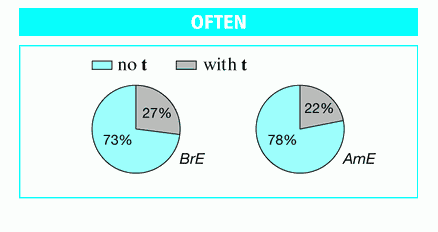[2010-05-31-1]の記事で「現代英語に起こっている言語変化」を箇条書きしたが,今回は文法変化に的を絞って,もう少し注目すべき項目を追加したい.以下は,Leech et al. による "A consensus list of grammatical topics worth exploring" である (18--19) .このリスト自体は Barber (130--44) に基づいているものである.いくつかの項目には hellog 内の関連する話題へのリンクも張っておいた.
・ decline of the inflected form whom (see [2011-01-09-1].)
・ use of less instead of fewer with countable nouns (e.g. less people)
・ regularization of irregular morphology (e.g. dreamt → dreamed) (for octopuses, see [2009-08-26-1], [2010-09-30-1]; for oxes, see [2010-08-22-1])
・ a tendency towards analytical comparison of disyllabic adjectives (politer, politest → more polite, most polite) (see [2010-06-04-1], [2010-07-27-1])
・ spread of the s-genitive to non-human nouns (the book's cover)
・ revival of the 'mandative' subjunctive, probably inspired by formal US usage (we demand that she take part in the meeting) (see [2010-03-18-1], [2010-03-19-1], [2010-04-07-1], [2009-08-17-1] )
・ elimination of shall as a future marker in the first person (see [2010-03-21-1], [2010-07-22-1])
・ development of new, auxiliary-like uses of certain lexical verbs (e.g. want to → wanna --- cf., e.g., the way you look, you wanna see a doctor soon)
・ further auxiliation of semi-auxiliaries and modal idioms such as be going to (→ gonna) or have got to (→ gotta) (see [2009-07-01-1])
・ extension of the progressive to new constructions (especially modal, present perfect and past perfect passive progressives of the type the road would not be being built / has not been being built / had not been being built)
・ use of like, same as, and immediately as conjunctions
・ omission of the definite article in combinations of premodifying descriptive noun phrase and proper name (e.g. renowned Nobel laureate Derek Walcott)
・ increase in the number and types of multi-word verbs (phrasal verbs, have / take / give a + verb)
・ placement of frequency adverbs before auxiliary verbs (even if no emphasis is intended --- I never have said so)
・ do-support for have (Have you any money? and No, I haven't any money → Do you have / have you got any money? and No, I don't have any money / I haven't got any money)
・ spread of 'singular' they (Everybody came in their car) to formal and standard usage. ( see [2010-01-27-1] )
その他,短縮否定 (e.g. isn't) の増加,ゼロ関係詞と that 関係詞の使用,New York City Ballet School instructor の類の名詞連鎖なども加えられるだろう.
・ Leech, Geoffrey, Marianne Hundt, Christian Mair, and Nicholas Smith. Change in Contemporary English: A Grammatical Study. Cambridge: CUP, 2009.
・ Barber, Charles. Linguistic Change in Present-Day English. Edinburgh and London: Oliver and Boyd, 1964.
[
|
固定リンク
|
印刷用ページ
]
